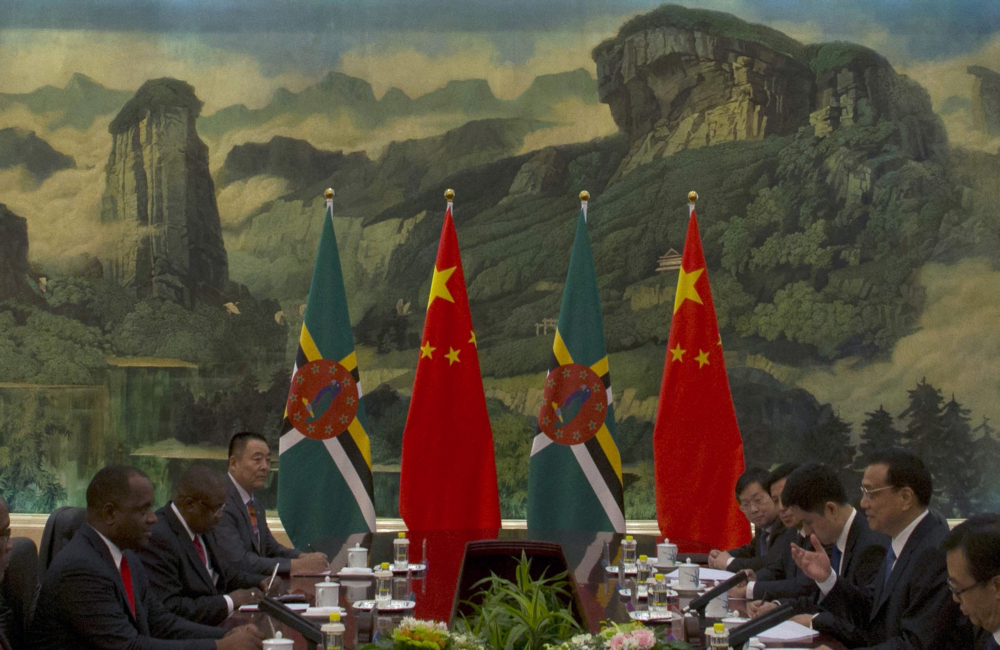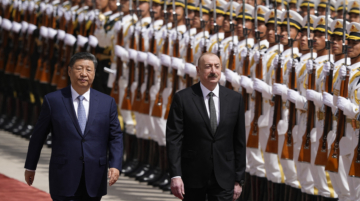
In contemporary international relations, the diplomacy of small states is of utmost importance. Though grand geopolitical narratives often overshadow this fact, one major power has not forgotten: China. Putting aside its broader strategic objectives, Beijing has excelled in small-state diplomacy. The numbers don’t lie; China has the largest diplomatic network in the world. Coupled with the Belt and Road Initiative (BRI) and the three “global initiatives” — the Global Development Initiative (GDI), the Global Security Initiative (GSI), and the Global Civilization Initiative (GCI) — China is exceptionally well-positioned to engage small states. But how effective is Beijing at courting these states?
Dominica offers a concrete example of China’s success. Roseau and Beijing established diplomatic ties in 2004, shortly after Dominica broke relations with Taiwan. Since then, the relationship has evolved steadily across multiple sectors, including development cooperation, disaster relief, health, infrastructure projects, and agricultural modernization. The BRI, the GDI, the GSI, and the GCI have all played an essential role in this regard. For resource-constrained countries like Dominica, which often must rely on multilateral diplomacy and informal mechanisms to achieve its goals, China’s model offers both means and opportunity to offset structural disadvantages. Through a blend of development, security, and cultural engagement, China’s approach to small state diplomacy has found success in Dominica.
Infrastructure Diplomacy
China’s economic investment in Dominica is significant. According to the China-CARICOM Portal, Chinese investments in the country total close to $625 million. For a country with a GDP of 688 million USD, that level of investment cannot be ignored. Most of those investments – actually 80% of it – goes to the construction industry (almost $495 million) with education ($110 million), trade and commerce ($12 million), technology ($4 million) and health ($4 million) receiving the remaining amount. Infrastructure, clearly, is the cornerstone of China’s engagement.
China’s support even predates Dominica’s entrance into the BRI in 2018, though the country remains an enthusiastic BRI participant. Key BRI infrastructure projects in Dominica are the Dominica International Airport (currently under construction), six post-hurricane schools, the Dominica-China Friendship Hospital, the $100 million West Coast Road rehabilitation, and the Dominica–China Friendship Bridge.
Overtime, the BRI has evolved from a simple collection of roads, railways, airports and ports to a broader development initiative that includes energy projects, mining investments, project financing, media cooperation, business and trade networks and social welfare projects. For Dominica, this opens access to a multilateral framework typically out of reach for small states.
While the BRI has attracted criticism in Western capitals for issues tied to project opacity, environmental and labor issues, and political blowback, Dominican officials remain largely supportive. Dominica’s ambassador to China characterized the BRI as “remarkably great” because of how it allows Dominica to attract loans from China with very low interest rates. The Minister for Public Works regarded it as an important development tool and an example of China’s unwavering support for Dominica. Even the long-serving prime minister Roosevelt Skerrit praised the BRI for providing material support for countries striving for economic independence and social development. For the small island, the benefits are clear while the downsides are yet to be seen.
One persistent point of contention is the apparent exclusive use of Chinese labor for BRI projects in Dominica. Though difficult to confirm definitively, Chinese laborers are frequently observed on infrastructure sites. Despite this, there is little public backlash. When asked, some Dominicans expressed more interest in the existence of the infrastructure than in who builds it. Among locals, it appears that the perception of short-term economic benefit is strong.
As of 2024, it was unclear to the Dominican press whether the almost $500 million in Chinese contracted projects were based on grants or loans, i.e. if the money had to be paid back or not. Some, like the international airport, are known to involve loans; others appear to be grants. The scale of Chinese financing—particularly if loan-based—raises questions about long-term economic dependence.
Development Partnership
Dominica’s development partnership with China hinges on the alignment of both countries’ strategies and high-quality BRI cooperation—but it goes beyond that. At the 4th Ministerial Meeting of the China-CELAC Forum, President Xi outlined a commitment to import more high-quality products from the Caribbean and to encourage Chinese enterprises to increase investment in the region.
In that regard, the Chinese distribution center in Dominica offers an interesting example of what the future holds for Dominica. Aimed at streamlining trade and boosting access to Chinese goods for local retailers, it signals a shift in the island’s trade landscape. According to China’s ambassador to Dominica, this aligns with Beijing’s broader emphasis on “high-quality development” through reform and increased consumption. This has again sparked concern over the long-term impact on local industries and the risk of strategic dependence—even as immediate economic benefits remain enticing.
An area where the development partnership is flourishing is on agriculture. China is actively supporting this sector through technical cooperation projects, equipment-supply and tech transfer. There is currently a China-Dominica Modern Agricultural Center and a technical cooperation project in place since 2005 .
A partnership of this kind offers a small state striving for development such as Dominica a big win as it tackles structural deficiencies in different sectors while pursuing the well-being of its population. For China, it means displaying soft power tools and reinforcing the development component of its global initiatives such as the BRI.
Security Cooperation
Dominica’s Defense Forces are relatively small and there are no major conflicts in the Caribbean. Accordingly, China’s security cooperation with Dominica is modest. A single known case of direct military aid occurred in 2017, when Beijing provided USD 3 million.
China’s security cooperation with Dominica is focused on disaster governance, cybersecurity, anti-corruption, narcotics control, and combating transnational organized crime.
These goals broadly align with those of the U.S.-led Caribbean Basin Security Initiative (CBSI), which also includes Dominica. In May 2025, CBSI efforts were reinforced by U.S. Secretary of State Rubio, who hosted Caribbean leaders—including Skerrit—for a summit on intelligence sharing, security, and border control.
For Dominica, the challenge is balancing these relationships without alienating the United States. Like many small states, Roseau seeks to maintain constructive ties with both powers, rather than being forced to choose.
China has responded by emphasizing mutual aid. Officials point to Dominica’s assistance following the 2008 Wenchuan earthquake and its poverty-alleviation efforts in Yunnan, as well as China’s support after Hurricane Maria (2017) and COVID-19 (2020). By framing cooperation as reciprocal rather than one-sided, China positions itself as a partner, not a patron—a narrative that resonates with small states.
Cultural Diplomacy
People-to-people exchanges are a growing pillar of Dominica–China relations. Cultural diplomacy has included scholarships and vocational training for Dominicans in China, and the establishment of a Confucius Classroom at Dominica State College.
In 2024, Prime Minister Skerrit and Chinese President Xi Jinping met in Beijing to commemorate 20 years of diplomatic ties. In this context, Xi was categorical in stating China’s advocacy for an “equal and orderly multipolar world” and emphasized on equality among members of the international community, no matter their size or power. He also stressed that South-South cooperation with Dominica was key to safeguarding both countries’ interests. He thanked Dominica for its role in promoting China-Caribbean cooperation during its time as CARICOM chair.
In response to this, Skerrit stated that Dominica and China should “enhance strategic communication, deepen the friendship between the peoples, strengthen comprehensive cooperation, be all-weather strategic partners, and bring Dominica-China relations to higher levels”. In doing so Dominica seeks to “actively implement a series of global initiatives”.
Dominica, Diplomacy, and the Global South’s New Alignments
China’s engagement with Dominica is both deep and multi-dimensional. But what does China gain by investing in small states like Dominica? The answer lies in the broader contest over the future of the global order. As the U.S. and China promote competing visions, Beijing is mobilizing support across the Global South—including from small states.
China’s strategy seems to be working in Dominica. In May 2025, Dominica joined Cuba and Jamaica at the Hong Kong Mediation Conference for the signing ceremony of the International Organization for Mediation—a China-backed body positioned as an alternative to the International Court of Justice and the Permanent Court of Arbitration. By sending Foreign Minister Vince Henderson, Dominica signaled its alignment with Beijing’s multipolar agenda.
Although it often flies under the radar, China’s small state diplomacy, as exemplified in Dominica, allows it to present itself as a leader of the Global South rather than a hegemon. In international forums—whether UN development conferences, climate talks, or political bodies like the Human Rights Council—support from small states like Dominica is valuable, especially under the one-state, one-vote rule.
For small states accustomed to being pushed around or overlooked, China’s model of engagement based on diplomacy, cooperation, and partnership are seen as a refreshing break from the norm. China’s small state diplomacy has a rather simple yet effective approach that has garnered approval in the global south. Dominica is a clear example of that. How far this model will go remains to be seen.
Alonso Illueca is CGSP’s Non-Resident Fellow for Latin America and the Caribbean.









